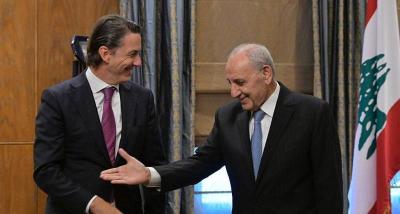In recent days, several European ambassadors have intensified their activities, conducting a series of visits, some to former officials, closely following the negotiations that led to the drafting and issuance of UN Resolution 1701, which halted hostilities between Hezbollah and Israel following the July 2006 war and governed the situation in the south until October 8, 2023. They have been inquiring about its precise foundations and some ambiguities, as well as the potential for it to regain its role as a "safety net" for this front and revert to its "dormant" status, especially after this resolution has become the primary victim of skirmishes across the Blue Line (on both sides of the border), which has suddenly turned into a fire line.
The Kuwaiti newspaper "Al-Rai" reported from informed sources that alongside the ambassadors' inquiries, U.S. Ambassador Dorothy Shea was firm in informing several parties and inquirers that "no one is considering any decision other than 1701" to overshadow the situation on the Lebanese-Israeli border and emphasized that there is no option but to activate its provisions and foundations.
Additionally, one of the officials who was central to meetings with Western ambassadors revealed to "Al-Rai" that they heard from Parliament Speaker Nabih Berri that communication has not ceased between him and U.S. envoy Amos Hochstein, who visited Beirut two weeks ago. The file regarding the land demarcation has not been withdrawn from discussion during the Gaza conflict but remains a focus of discussions and attempts with both the Lebanese and Israeli sides. This comes from a position communicated to Hochstein that resolving the 13 disputed points that Lebanon holds regarding the Blue Line, including point B1, would be sufficient to find a "final solution" for the southern front, though it remains unclear whether the proposal includes a complete withdrawal of Israel from Ghajar, the Kfarshouba hills, and the occupied Shebaa Farms or some sort of "transitional" arrangement under the auspices of the United Nations.
It was not coincidental in the context of efforts to "restore the status" of Resolution 1701 that the U.S. embassy adopted the position of the commander of UNIFIL, General Aroldo Lazzaro, who warned that "any further escalation in southern Lebanon could have devastating consequences," urging the parties "to reaffirm their commitment to Resolution 1701 and to halt hostilities while seeking long-term solutions to address the underlying causes of the conflict."




